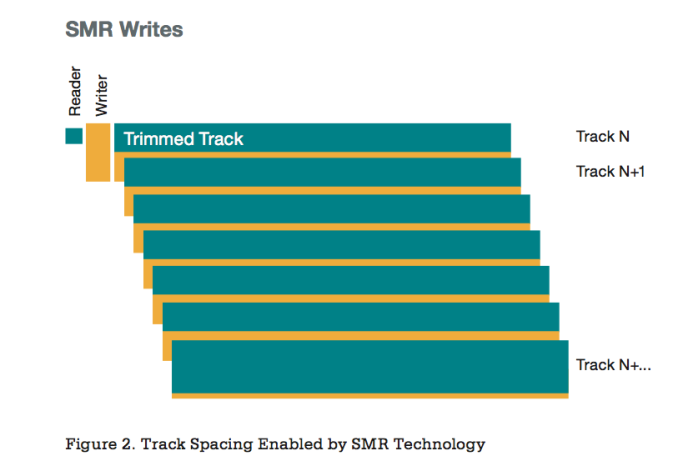Seagate Begins to Ship 2.5-Inch, 7mm Thick 2 TB Mobile Hard Drives with SMR
by Anton Shilov on February 18, 2016 8:00 AM EST- Posted in
- HDDs
- Storage
- Seagate
- SMR
- Mobile HDD
- Cold Storage
- 7mm

Seagate has started to ship its highest-capacity hard drives for notebooks. The new HDDs use shingled magnetic recording (SMR) technology with very high areal density as well as slimmed-down mechanics.
The new Seagate Mobile HDD 2 TB is the first hard drive to market in a 2.5-inch/7 mm form-factor with such extreme capacity. The hard drive is based on two 1 TB SMR platters running at 5400 RPM and features 128 MB of cache as well as SATA interface. The maximum sustainable transfer rate of the HDD is 100 MB/s, which is considerably lower than that of mainstream mobile hard drives (145 – 169 MB/s for Seagate’s own laptop HDDs). Seagate declares 13 ms average seek time for the hard drives. The new HDD weighs 3.17 oz (or 90 grams) and is aimed primarily at mobile computers or bulk cold storage, where you can arguably fit eight drives into a single 5.25-inch bay. Supermicro has an 88-bay 4U rack unit where each drive is hotswappable, though that fits a large PC in the rear; if hot-swappable isn't required, we could be looking at nearly 200+ per storage 4U rack with appropriate backplanes.
Three sets of drives will be offered, in 1TB and 2TB configurations:
| 2TB | 1TB | |
| Base Model | ST2000LM007 | ST1000LM035 |
| Seagate Secure Model (Self Encryption) |
ST2000LM009 | ST1000LM037 |
| Seagate Secure FIPS Model (FIPS 140-2) |
ST2000LM010 | ST1000LM038 |
The SMR technology enables areal densities higher than 1 Tbit per square inch, but at the cost of performance. HDDs featuring shingled recording write new magnetic tracks that overlap part of the previously written tracks, which may slowdown writing since the architecture requires HDDs to rewrite adjacent tracks after any writing operation. In order to “hide” such peculiarities of SMR, Seagate has developed special firmware that ensures optimal writing performance. Part of the reason why Seagate installs a massive 128 MB cache on a 2 TB HDD is because the firmware needs it to store data from tracks that have to be overwritten. Alternatively, it is required to alter operating systems and software, which is not economically feasible.
Usage of SMR technology is justified in environments that are used to archive cold data that is not updated frequently because write performance of such HDDs may be rather slow. Client PCs both read and record data and it remains to be seen whether performance offered by SMR-based client HDDs will be sufficient for the end-user. The Seagate Mobile HDD 2 TB is around 60% slower than the Seagate Laptop HDD 2 TB based on maximum sustainable transfer rate.
Seagate did not disclose whether SMR platters used inside the Mobile HDD 2 TB are made in-house, or by Showa Denko K.K. (SDK), the world’s largest independent producer of hard drive platters. In addition to SMR technology, Seagate used its new mechanics, including new head, preamp, channel and other mechanisms for the Mobile HDD 2 TB HDD. Slimmed down mechanical components allowed Seagate to integrate two platters into a 7 mm hard drive.
Seagate did not reveal any information concerning pricing of its new HDDs. While the product is unique because of its form-factor and capacity, its performance is lower compared to other HDDs. It will be very interesting to see how Seagate prices its new HDD, given its pros and cons.
Related Reading
Seagate to Ship 5TB HDD in 2014 using SMR - Brief SMR Overview
Seagate Mobile HDD Specifications (1TB and 2TB) - Specifications
Source: Seagate












29 Comments
View All Comments
Lolimaster - Thursday, February 18, 2016 - link
Rocking 4 6TB WD Blacks for my friends private network (movies, anime, manga, comics, popcorn, emulators).Spectrophobic - Thursday, February 18, 2016 - link
"popcorn"( ͡° ͜ʖ ͡°)
tipoo - Thursday, February 18, 2016 - link
Are they going to make more laptop hybrids? I'd love that 2TB one with 16GB NAND cache for consoles in particular.jasonelmore - Thursday, February 18, 2016 - link
seagate already has a 2 TB 2.5 drive for under $80, and its pretty damn slim.. without the SMR performance penalty at 9.5mmSeems like a lot of sacrifice just for 2.5mm, but props for pushing the technology
darkfalz - Friday, February 19, 2016 - link
Pretty happy with the 2TB Samsung in my Laptop, although I think that's 9.5mm. I think SMR is more suited to write once, read many applications like media collections.Shame that HVD and so on never panned out - BDR is more expensive per GB than HDDs which is crazy. 25GB is pretty small by modern standards. It would be cool if we could have a HDD format which was essentially like a caddy because bare drives with PCB exposed and the like don't exactly store/stack nicely for use in docks.
lmcd - Saturday, February 20, 2016 - link
You just ignored an entire area of HDD design involving keeping this thing from shocks and anything that could damage it (read: nearly everything).But cool thought, wonder if anyone else thought of it :P
AnnonymousCoward - Friday, February 19, 2016 - link
Seagate needs to match the reliability of WD or Toshiba platters before I'd consider.ZaphodB - Wednesday, March 2, 2016 - link
You're behind the times...Backblaze published a new report covering their experience from 2013-2015 and we don't hate Seagate anymore, we hate WD now... But (...they find that...) HGST disks are still more reliable than any other brand they use.Osamede - Friday, March 4, 2016 - link
Quieter & cooler than 3.5". Yet, cheaper than SSD. That's why.